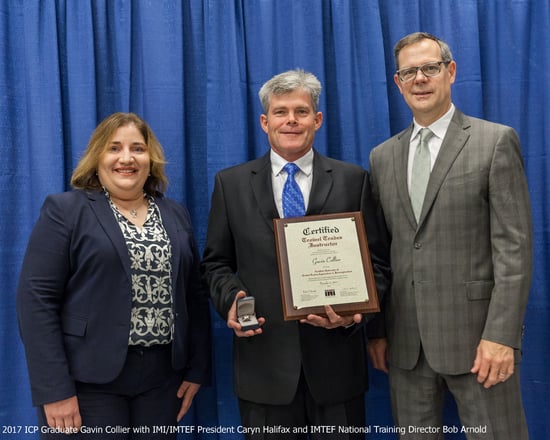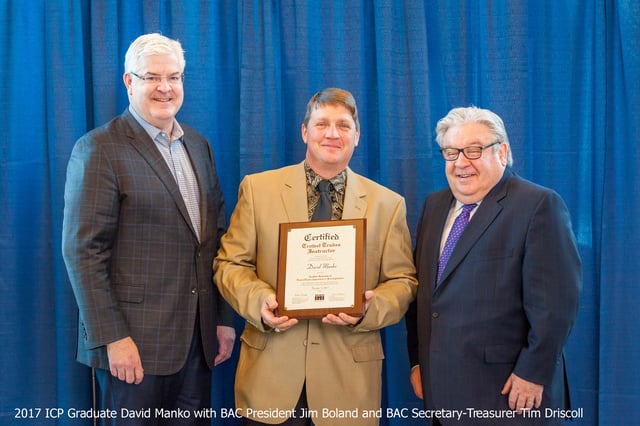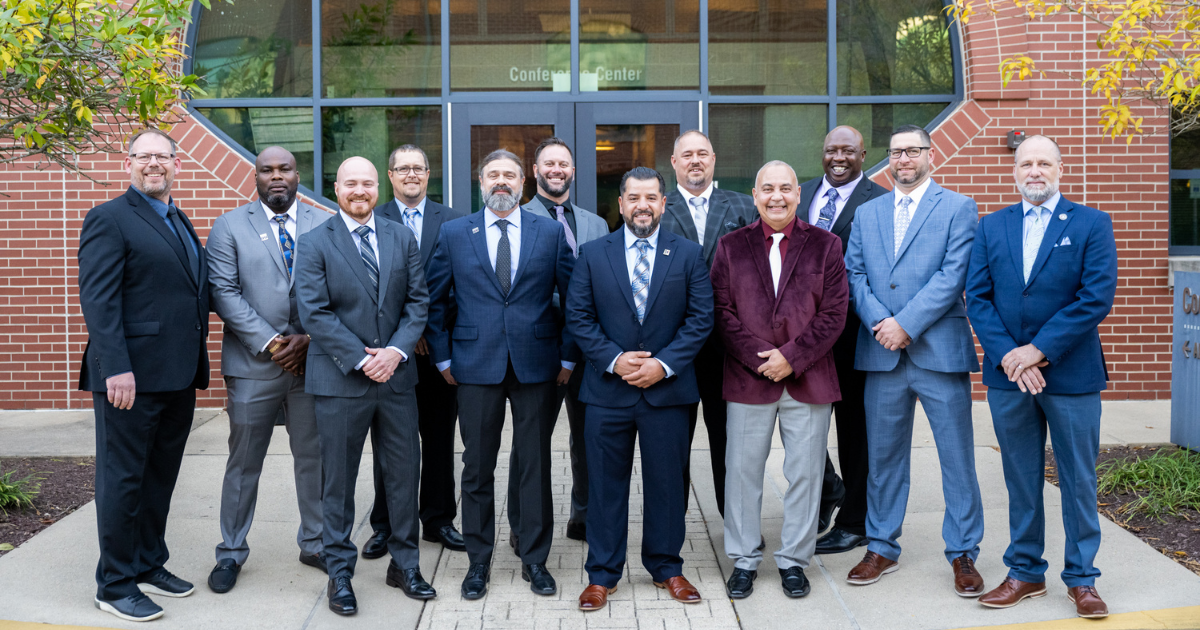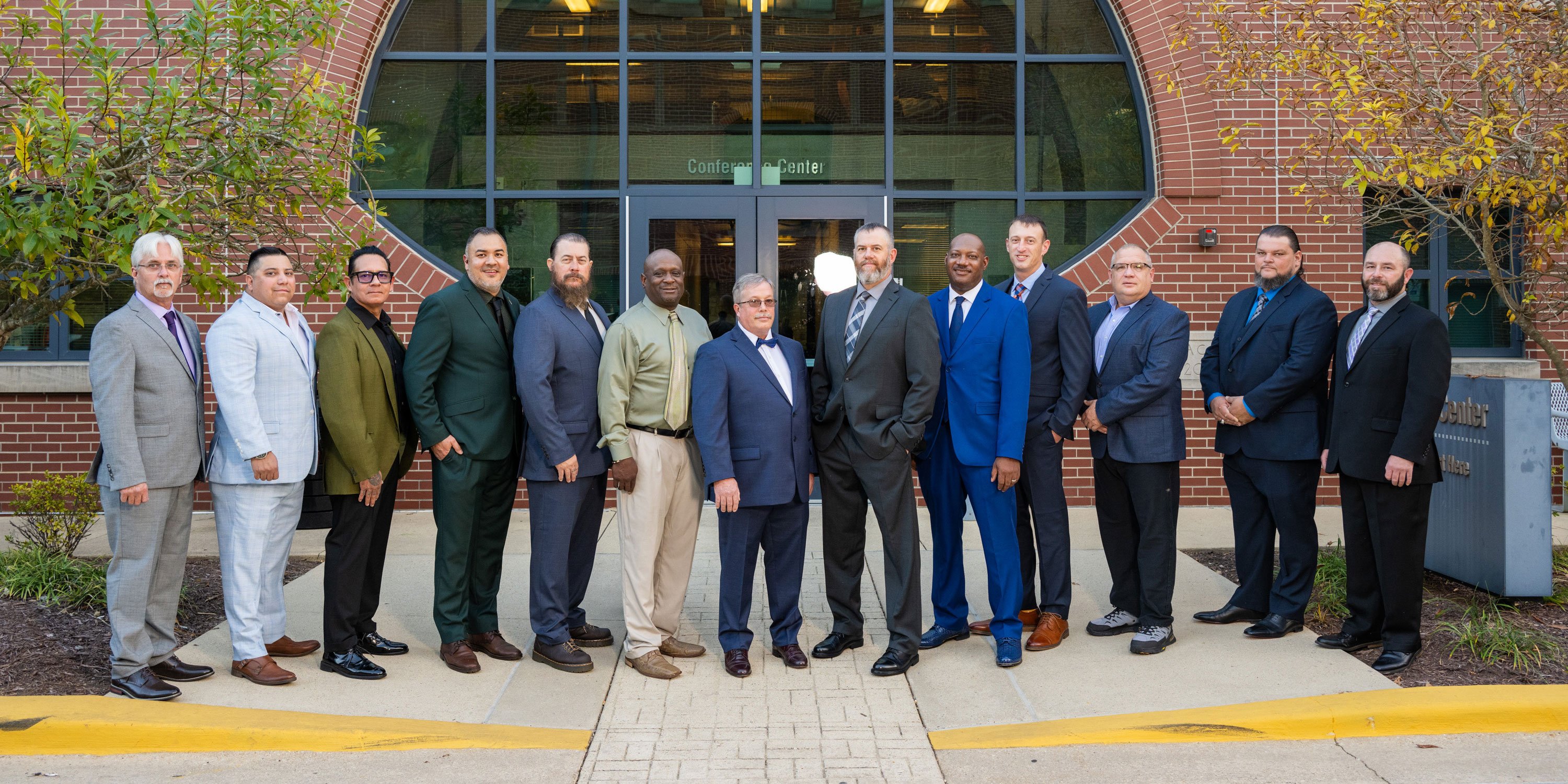On November 9, 2017, 14 members of the International Union of Bricklayers and Allied Craftworkers' (BAC) graduated from IMTEF/IMI’s Instructor Certification Program. ICP is a 5-year, 200-hour educational program designed to develop instructors qualified to effectively teach BAC training programs.

The Union Difference: Quality Training and Instruction
 “Providing quality training to craftworkers is one of the most important things the union does,” said IMI/IMTEF President Caryn Halifax in her opening remarks at the 2017 ICP graduation ceremony. During the event, each graduate was presented with a plaque and ring by IMTEF National Training Director Bob Arnold and his staff, who remarked on what an accomplishment it is to successfully complete the rigorous program.
“Providing quality training to craftworkers is one of the most important things the union does,” said IMI/IMTEF President Caryn Halifax in her opening remarks at the 2017 ICP graduation ceremony. During the event, each graduate was presented with a plaque and ring by IMTEF National Training Director Bob Arnold and his staff, who remarked on what an accomplishment it is to successfully complete the rigorous program.
ICP graduates echoed Halifax’s and Arnold’s sentiments in reflecting on their experience in ICP. “Training apprentices is an extremely rewarding career. Although I took pride in all the work I did in the field, it’s a different feeling when you can train someone and then get them a union job. For a lot of my apprentices, these are life-changing opportunities,” said Gavin Collier, Tile Apprenticeship Coordinator at BAC’s District Council Training Center in Illinois.
His colleague, Dave Naprstek, Brick Apprenticeship Coordinator at the District Council Training Center in Illinois, agreed: “All our union has to offer is a trained workforce. That is the value that we give to our contractors and the industry. In order for that workforce to have value, it must be trained well. That is my job.”
Mastering Skills Beyond the Trowel Builds Better Instructors & Craftworkers
To qualify for ICP, participants must be experienced journey-level craftworkers employed as instructors by their local JATC. ICP graduates are skilled in more than tools and materials, though: they know how to help students succeed, and how to structure a training program that meets the needs of members throughout their working life.
“Before ICP, I knew how to do the work, but I didn’t know the reasons behind why it was done that way. After ICP and through trial and error, I have come to realize that planning and classroom work makes a world of difference. Now I can instruct students not only on how it’s done, but the reason why it’s done that way,” remarked Richard Taylor of BAC Local 5 Oklahoma/Arkansas/Texas.
Taylor wasn’t the only instructor whose perception of classroom learning shifted over the course of the program. “ICP has led me to rethink my old instructional framework – my old way of  learning and teaching – that student learning should only take place on the job site,” said David Manko of BAC Local 9 Pennsylvania. “Through ICP, I realized that bringing those skill sets into the classroom so students can produce results without judgement and with fair evaluation is a more effective method of learning.”
learning and teaching – that student learning should only take place on the job site,” said David Manko of BAC Local 9 Pennsylvania. “Through ICP, I realized that bringing those skill sets into the classroom so students can produce results without judgement and with fair evaluation is a more effective method of learning.”
Beyond demonstrating the value of classroom learning, ICP equips instructors with the tools they need to build and present coursework, improving their skills with technology, public speaking, and more.
“[Before ICP], my lack of computer skills made my teaching job difficult. Today, I am able to put together PowerPoints, create a spreadsheet, do mass mailings, and navigate through Word, Excel, and Adobe Reader without a problem,” said Stephen Carney IV of BAC Local 1 Connecticut.
Joseph Pugliano of BAC Local 9 Pennsylvania agreed: “I learned not to be afraid of technology, but rather to think of it as another tool in my arsenal.”
“I really enjoy sharing my knowledge and experiences in a trade that I love,” said Anthony Demme, Tile Instructor with the District Council Training Center in Illinois. “I never had a problem instructing in the shop area where we are hands on, but when it came to the classroom, I always felt that I wasn’t giving my apprentices the guidance that they deserved. To say that ICP met my expectations in improving my teaching abilities in an understatement – this program helped me with PowerPoint creation, curriculum development, course creation, computer skills development, and understanding different ways people learn so I can better identify learning behaviors and help them retain the information I am teaching.”
To Teach, Learn How Students Learn
A foundational component of the ICP program for many participants is just what Demme referenced: understanding the varied ways students learn, and how to cater to those different styles.
“Learning how students learn is one of the biggest takeaways from ICP. How they relate and what you say to them can literally be the difference between making it and dropping out” said Keith Inglin of BAC Local 4 New Jersey.
“Understanding the different processes that have to take place for young adults to learn and retain information has made me take on a whole new approach to teaching and making my classes more effective for the students,” said Eric Doherty, a colleague of Inglin’s at BAC Local 4 New Jersey. “I realized that everyone may not be on the same page as each other and that you have to make every class interactive in multiple different ways to make sure every student can learn in their own way.”
Instructor Comradery Leads to Shared Lessons and Learning
 One of the biggest assets ICP instructors have is one another. The shared experience of teaching BAC members throughout the country creates a connection between participants that allows them to network and learn from one another.
One of the biggest assets ICP instructors have is one another. The shared experience of teaching BAC members throughout the country creates a connection between participants that allows them to network and learn from one another.
“Sharing conversations about work and apprentices has to be the most informational learning there is,” said Joseph Schmidt of BAC Local 3 New York.
“I always looked forward to lunch and dinner,” said Dan Flores of BAC Local 4 Indiana/Kentucky. “Not just because of the great food, but because it meant sitting down with other ICP students and hearing about their common struggles, which related pretty much to everyone else’s at the table. Ideas for possible solutions were kicked around and brought back to training centers for implementation. In subsequent years around the dining tables, you would hear, ‘I tried what we talked about last year’ or ‘Thanks for the suggestion, it worked really well.’ [The time to share stories and best practices] was just as important to me as the scheduled training we received each year.”
Instructors Take Pride in Carrying on Legacy of Craft
Many ICP graduates consider the certification one of the biggest accomplishments of their career. “Earning this along with my classmates is one of my proudest moments,” said Naprstek.
But ICP instructors also know that the certification is about more than them: it’s about training better craftworkers to carry on the union and the craft.
“My biggest responsibility is to the apprentices, and helping them be the best craftperson they can be,” said Jeffrey Garnett, Apprenticeship Instructor with BAC’s Southern Ohio-Kentucky Regional Training Center.
Christopher Busch of BAC Local 3 Iowa agreed: “The reward of taking someone who knows nothing of our trade and coaching and mentoring them to become a quality craftsman is one of the most satisfying things I can imagine doing.”
Dennis Whytas of BAC Local 3 New York also remarked on his pride in bringing up the next generation. “To see students go from hesitant kids with wide-eyed stares to confident bricklayers is an awesome feeling. They go from not being able to lay brick to the line, to being able to build corners, keeping them plumb, striking up nice, and most of the time, hitting their heights. These students go on to help build some of the most important buildings in the area. I can go back and look at my students for as long as I live, knowing that I helped contribute to their success.”




















